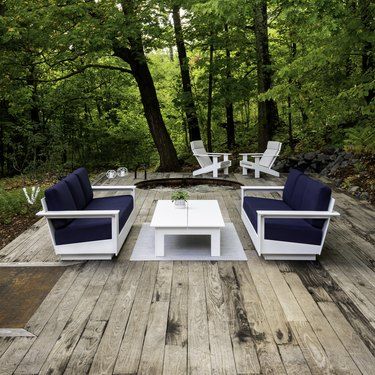In an era where sustainability and eco-consciousness are becoming increasingly important, it’s crucial to consider the impact of our lifestyle choices, including the furniture we use. Outdoor furniture, in particular, plays a significant role in our outdoor spaces, and opting for sustainable options can make a positive difference. This article will explore the importance of sustainable outdoor furniture and provide some eco-friendly choices worth considering.
The Importance of Sustainable Outdoor Furniture
Traditional outdoor furniture often contributes to deforestation, excessive energy consumption, and pollution. By investing in sustainable outdoor furniture, we can help mitigate these environmental issues and work towards a greener future. Sustainable outdoor furniture is typically produced using eco-friendly materials and manufacturing processes, ensuring minimal harm to the planet.
Eco-Friendly Materials for Outdoor Furniture
When searching for sustainable outdoor furniture, prioritize materials that have minimal environmental impact. Some popular choices include:
Bamboo: This fast-growing grass is a great alternative to wood. Bamboo is renewable, durable, and aesthetically appealing.
Recycled Plastic: Furniture made from recycled plastic not only reduces waste but also requires no maintenance and can withstand various weather conditions.
Reclaimed Wood: Opting for furniture made from reclaimed or salvaged wood helps reduce deforestation and gives new life to old materials.
Teak: Look for certified sustainable sources of teak, as it is known for its durability and resistance to decay.
Manufacturing Processes and Certifications
It’s not just about the materials used; the manufacturing processes also play a crucial role in determining the sustainability of outdoor furniture. Look for manufacturers who prioritize:
Minimal Resource Consumption: Companies that aim to minimize water and energy usage during production have a lower environmental impact.
Waste Reduction and Recycling: Manufacturers that have efficient waste management systems and incorporate recycled materials contribute to a circular economy.
Certifications: Look for certifications such as Forest Stewardship Council (FSC) or the Sustainable Furnishings Council (SFC) to ensure the furniture meets specific sustainability standards.
Considerations for Longevity and Maintenance
Choosing sustainable outdoor furniture is not just about the initial purchase; longevity and maintenance should also be taken into account. Look for furniture that can withstand the elements, has weather-resistant coatings, and is easy to clean. Opting for materials that require minimal upkeep, such as recycled plastic or teak, can also contribute to the overall sustainability of the furniture.
Supporting Local and Ethical Brands
When purchasing outdoor furniture, consider supporting local artisans and brands that prioritize ethical labor practices. By choosing locally made products, you reduce the carbon footprint associated with transportation and support local economies. Furthermore, ethical manufacturing ensures fair wages and safe working conditions for workers.
Secondhand and Upcycled Options
Another eco-friendly option for outdoor furniture is to explore secondhand or upcycled pieces. This helps reduce waste by giving old furniture a new lease on life. Look for thrift stores, online marketplaces, or local swap groups where you can find unique and sustainable outdoor furniture options.
Conclusion
Choosing sustainable outdoor furniture is an essential step towards creating a more eco-friendly and responsible lifestyle. By opting for eco-friendly materials, supporting ethical brands, and considering longevity and maintenance, we can make a positive impact on our environment. So, the next time you’re shopping for outdoor furniture, make a conscious choice in favor of sustainability and embrace the beauty of nature while minimizing your ecological footprint.
